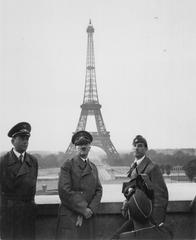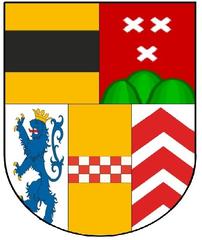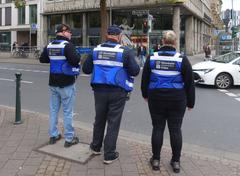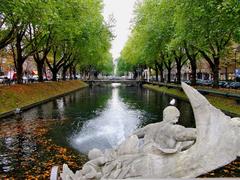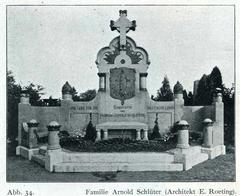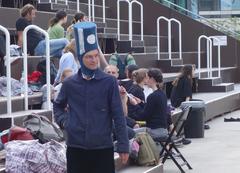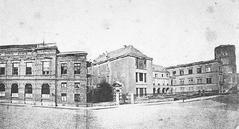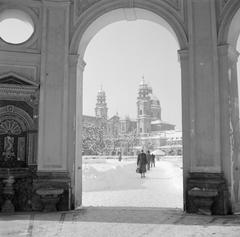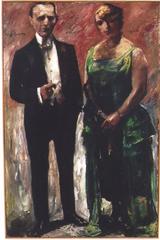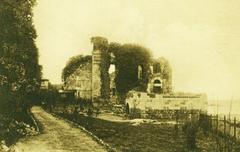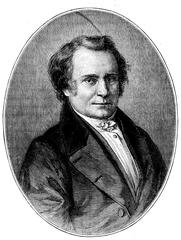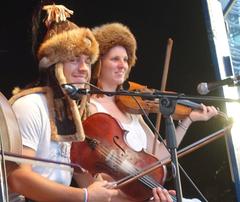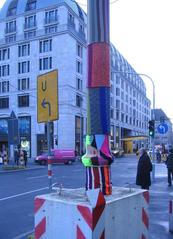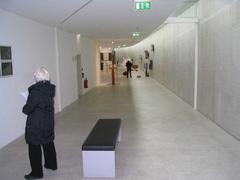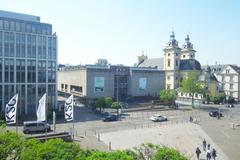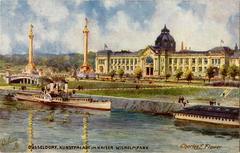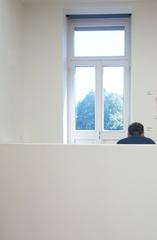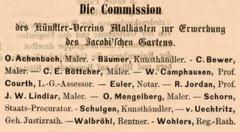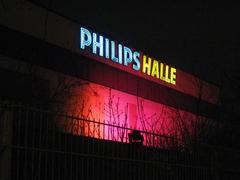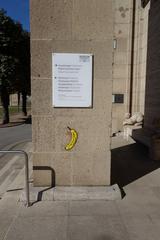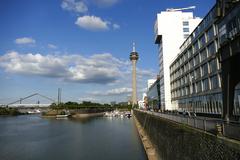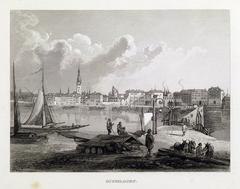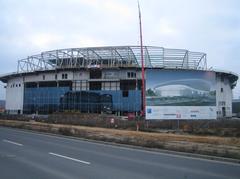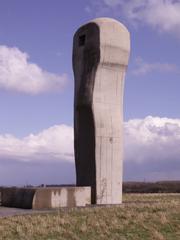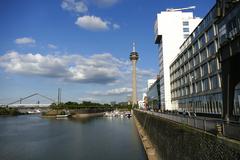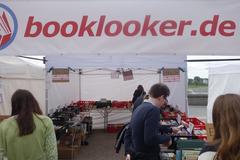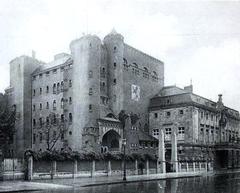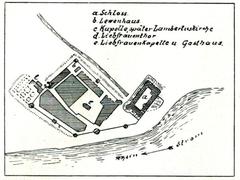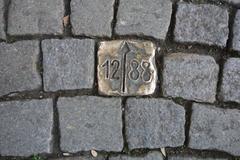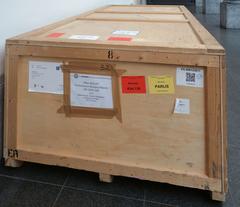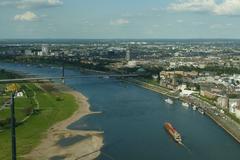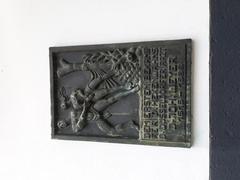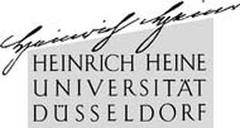Museum Kaiserswerth: Visiting Hours, Tickets, and Düsseldorf Historical Sites Guide
Date: 14/06/2025
Introduction: Museum Kaiserswerth—Where History and Culture Converge
Nestled in Düsseldorf’s historic Kaiserswerth district, Museum Kaiserswerth invites visitors to explore the layered history and vibrant culture of one of the city’s oldest neighborhoods. Set within the early 20th-century former Lyzeum school building, the museum brings Kaiserswerth’s journey to life—from its founding by Saint Suitbert around 700 CE, through its imperial era with the Kaiserpfalz palace, to its role in pioneering modern nursing at the Deaconess Institute. Exhibits range from a remarkable 6x4 meter ceramic model of medieval Kaiserswerth to archaeological artifacts and regional artworks, all reflecting the district’s enduring educational and social heritage (Museum Kaiserswerth).
This comprehensive guide covers everything you need for your visit: up-to-date information on opening hours, ticketing, accessibility, travel advice, and highlights of both the museum and the surrounding Kaiserswerth district. Whether you are a history enthusiast, art lover, or traveler, Museum Kaiserswerth offers an intimate, immersive window into Düsseldorf’s past—enhanced by its scenic setting on the Rhine, proximity to the Kaiserpfalz ruins, and St. Suitbertus Basilica. The museum also hosts cultural programming, guided tours, and special exhibitions, serving as a dynamic hub in Düsseldorf’s network of historical sites (Visit Düsseldorf, Wikipedia: Kaiserswerth).
Table of Contents
- Discover Museum Kaiserswerth: Key Visitor Information
- History and Development of Museum Kaiserswerth
- Museum Collections and Highlights
- Cultural and Community Role
- Architectural and Urban Context
- Nearby Attractions
- Frequently Asked Questions (FAQ)
- Plan Your Visit: Practical Details and Resources
- Exploring Kaiserswerth: Historical Landmarks, Local Culture, and Travel Tips
- Summary and Call to Action
Discover Museum Kaiserswerth: Key Visitor Information
Visiting Hours and Tickets
Museum Kaiserswerth is open exclusively on weekends and public holidays:
- Saturdays: 14:00–17:00 (winter), until 18:00 (summer)
- Sundays and Public Holidays: 11:00–17:00 (winter), until 18:00 (summer)
Admission is free for all visitors; donations are welcome to support preservation and programming. Guided tours can be booked in advance through the museum’s official website and are especially recommended during special exhibitions.
Accessibility and Travel Tips
The museum is partially accessible: the main exhibition areas are generally accessible to those with limited mobility, but steps at the entrance may restrict wheelchair access. Visitors are encouraged to contact the museum in advance for specific needs (solosophie.com).
Getting There:
Museum Kaiserswerth is located at Fliednerstraße 32, 40489 Düsseldorf. It is easily reachable via the U79 tram from Düsseldorf city center (stop: Kittelbachstraße or Kaiserswerth), followed by a short walk. Street parking is available but can be limited during weekends or events (germanytravel.blog).
History and Development of Museum Kaiserswerth
Medieval Foundations
Kaiserswerth’s history begins with the founding of a Benedictine abbey around 700 CE by Saint Suitbert, which played a key role in the region’s Christianization. The abbey’s legacy endures in the Romanesque St. Suitbertus Basilica (Notes from Camelid Country).
The Kaiserpfalz and Imperial Kaiserswerth
The Kaiserpfalz, an imperial palace built before 1016 CE, transformed Kaiserswerth into a strategic center of imperial power and river commerce. Emperor Frederick Barbarossa’s establishment of Rhine customs here in 1174 gave Kaiserswerth its name, meaning “Emperor’s Isle.” Today, the atmospheric ruins and the museum’s detailed clay model vividly portray this era (Gypsy With a Day Job, Visit Düsseldorf).
Political Turmoil and Social Reform
Kaiserswerth witnessed pivotal events, such as the 1062 abduction of King Heinrich IV and devastation during the War of the Spanish Succession (1702). In the 19th century, the Kaiserswerth Deaconess Institute revolutionized nursing and social care. Florence Nightingale famously trained here before her work in the Crimean War (Wikipedia: Kaiserswerth).
Museum Collections and Highlights
The Medieval Clay Model
The museum’s centerpiece is a 6x4 meter ceramic model created by Hannes Esser, providing a tactile, bird’s-eye view of Kaiserswerth before its 18th-century destruction. This detailed reconstruction is accompanied by historic maps, prints, and town plans (Museum Kaiserswerth, germanytravel.blog).
Archaeological and Artistic Exhibits
Permanent displays feature ceramics, coins, medieval artifacts, original documents, and artworks by local artists, including Wilhelm Degode and Fritz Köhler. Rotating temporary exhibitions keep the experience fresh, often highlighting contemporary artists and regional history.
Educational Resources, Tours, and Events
The museum offers a specialized library, interactive panels, and regular guided tours (available in German; some materials in English). Special programs include workshops, lectures, and cultural events (museum-kaiserswerth.de).
Cultural and Community Role
Museum Kaiserswerth preserves the district’s independent identity and links local heritage to broader European narratives—such as the Holy Roman Empire and the advancement of nursing. Through community events and temporary art exhibitions, the museum remains a vibrant cultural center (Museum Kaiserswerth).
Architectural and Urban Context
Located in a historic school building, the museum is surrounded by Kaiserswerth’s cobblestone streets, half-timbered houses, and the lively Kaiserswerther Markt. Its proximity to the Kaiserpfalz ruins and St. Suitbertus Basilica enhances its appeal for heritage tourism (Kaiserswerth Rundgang).
Nearby Attractions
- Kaiserpfalz Kaiserswerth: Imposing imperial palace ruins on the Rhine, open April–October (germanytravel.blog).
- St. Suitbertus Basilica: Romanesque church with a famed reliquary (visitduesseldorf.de).
- Kaiserswerther Markt: Picturesque square with boutiques, bakeries, and the iconic Lido ice cream parlor.
- Riverside Promenades: Ideal for walking, cycling, and picnics.
- Wildpark im Grafenberger Wald: Family-friendly wildlife park nearby (travel2next.com).
Frequently Asked Questions (FAQ)
Q: What are the Museum Kaiserswerth opening hours?
A: Saturdays 14:00–17:00 (winter)/18:00 (summer); Sundays and public holidays 11:00–17:00 (winter)/18:00 (summer).
Q: Is there an admission fee?
A: Admission is free; donations are appreciated.
Q: Is the museum accessible for wheelchair users?
A: The main exhibition spaces are generally accessible, but steps at the entrance may limit full access. Please contact the museum in advance.
Q: Are guided tours available?
A: Yes, especially during special exhibitions; advance registration is recommended.
Q: How do I reach the museum by public transport?
A: Take the U79 tram to Kittelbachstraße or Kaiserswerth and walk about 10 minutes.
Q: Is photography allowed?
A: Non-flash photography is generally permitted; check with staff for restrictions during special exhibitions.
Plan Your Visit: Practical Details and Resources
- Address: Fliednerstraße 32, 40489 Düsseldorf
- Phone: +49 (0)211 403614
- Email: [email protected]
- Website: www.museum-kaiserswerth.de
- Admission: Free (donations welcome)
- Facilities: Basic amenities; no café or gift shop, but plenty of dining nearby
Guided Tours:
Arrangements for private and group tours can be made via the museum’s contact page.
Membership:
Support the museum by joining Heimat- und Bürgerverein Kaiserswerth e.V. for €30/year (discounts available), with access to special events and publications.
Exploring Kaiserswerth: Historical Landmarks, Local Culture, and Travel Tips
Historical Landmarks
- Kaiserpfalz: Explore the atmospheric ruins and panoramic views of the Rhine.
- St. Suitbertus Basilica: Experience the peaceful cloister garden and Romanesque architecture.
Local Culture & Culinary Experiences
- Cafés and Beer Gardens: Enjoy local pastries, brews, and riverside relaxation (germanytravel.blog).
- Boutiques: Shop for fashion and household items at independent stores on Kaiserswerther Markt.
Outdoor Activities
- Rhine Promenades: Ideal for walking, jogging, and cycling.
- Wildpark im Grafenberger Wald: Free-entry wildlife park for families.
Travel Tips
- Getting There: U79 tram from Düsseldorf Hauptbahnhof; DüsseldorfCard for free public transport and attraction discounts.
- Footwear: Wear comfortable shoes for cobblestone streets and uneven terrain.
- Seasonal Events: Check for open-air concerts, markets, and festivals.
Summary and Call to Action
Museum Kaiserswerth is a gateway to understanding Düsseldorf’s rich past, from medieval foundations and imperial intrigue to social reform and vibrant local culture. With its free admission, engaging exhibits, and exceptional setting, it’s a must-visit for anyone seeking an authentic cultural experience in Düsseldorf. Pair your museum visit with walks along the Rhine, exploration of the Kaiserpfalz ruins, and sampling of local cuisine for a perfect day in Kaiserswerth.
Stay updated:
- Visit the official Museum Kaiserswerth website
- Download the Audiala app for interactive audio guides and travel tips
- Follow the museum and Audiala on social media for the latest news and inspiration
References
- Museum Kaiserswerth Official Website
- Wikipedia: Kaiserswerth
- Visit Düsseldorf: Museum Kaiserswerth
- Germany Travel Blog: Kaiserswerth Guide
- Notes from Camelid Country: Kaiserswerth Overview
- Gypsy With a Day Job: Kaiserswerth Cultural Insights
Visuals: To enhance your experience, consider browsing the museum’s website for images of the exterior, ceramic city model, Kaiserpfalz ruins, and the scenic Rhine promenade.
